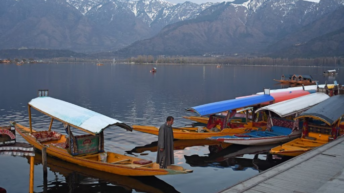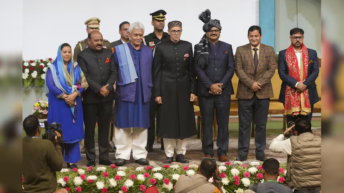|
Listen to article
Getting your Trinity Audio player ready...
|

A recent visit to Moscow, the first in several years, gave me an obviously incomplete but still revealing, overview of where the nation finds itself today. The bustling, glittering, and sprawling megalopolis, with its gold-domed churches, towering glass skyscrapers, monumental palaces, and spacious avenues does not show a real picture of the country (no capital city does) but it gives a sense of the resilience, purposefulness, material wealth and intellectual acumen of this immense nation, gifted with almost all natural resources found on earth and with a strategic location that makes her the most direct land bridge between the Far East and Europe, in the heartland of Eurasia.
In many areas, Russia has made impressive technological progress in the last two decades. She is now much more self-sufficient than she was until 2014, the year when the Ukrainian crisis began with the US-sponsored coup that brought to power a NATO-backed regime. The Russian Federation has boosted its productivity in many areas, particularly in the critical energy sector but also in agriculture, high technology and defence. She has modernized her transportation infrastructure while shifting much of her trade to the East and South. The digitalization of the economy and of daily life, at least in the principal cities, has gone ahead at full speed and little cash is now used in Moscow where most expenses are payable by smartphone. The artistic and cultural life of the ‘Third Rome’, as some Russians still like to call it, is unsurpassed in Europe. Theaters, concert halls, and museums are full and usually offer first-rate performances and exhibitions. Restaurants and cafes are crowded and the quality of food and refreshments is quite satisfactory, as is the courteous and friendly service. Remembering the rather sullen demeanors prevalent in the USSR makes one appreciate even more the smiling faces and gracious welcome that are now the norm.

The mixed civilisation that Russia has long embodied yields a striking combination of nationalist pride, the nostalgia of the Romantic Tsarist era, and empathy with oriental cultures whose mystical dimension resonates with the Slav orthodox soul. However extreme modern trends, in their punk and hard Rock dimensions, are popular with the youth, even though the ruling ideology, strongly influenced by the Eastern Christian tradition, frowns on them. It is easy to see society ladies dressed in finery evocative of the Parisian Belle Epoque at one moment and in the next moment tattooed kids clad in black tea shirts, battle fatigue pants and boots, with orange or green-dyed hair the next.
In strategic spots, posters of servicemen who gave their lives fighting in Ukraine are displayed. That war, however, has a marginal effect on the life of the metropolis, dotted with monumental recollections of the former Ukrainian Soviet Republic that Russians still regard as an estranged and misled younger sister. They like to recall that the Tsars carved out that future country when they took much of that territory from the Ottoman Empire and integrated the Cossacks within Mother Russia. Many today rue the Marxist notion of nationalities that gave the Ukrainian SSR her partly artificial boundaries, the main cause of today’s tragedy.
Russians are reputed for their stoicism in times of trial. An aged Professor told me that, while Hitler’s armies were at the gates, the Russian Government opened a factory of sparkling wine in the city, as if to highlight the spirit of resistance to the invaders.

One feature of life in Moscow is the apparent security that its inhabitants enjoy. Women go to jog or walk their dogs alone late at night in the sprawling parks, more like urban forests, where running streams meander among the conifers and natural springs feed ponds where beavers build their villages. Muscovites swim the Moskva River near the city centre, even in sub-zero temperatures. The restoration of law-and-order after the somber post-communist period, and the cleanliness should be the envy of American and even Western European cities increasingly defaced by vandalism, drug-addled vagrancy and crime.
A common impression abroad, constantly promoted by western-influenced media, is that Russia has become a vassal of China as a result of sanctions imposed by the US and its allies. Indeed, the relations with Beijing are cordial and the cooperation extensive but there are clear dividing lines between the two countries. Some high-level officials and scientists have been arrested in recent years for spying on behalf of the PRC and long-term visas are not easily given to Chinese nationals. It is another matter that control over border crossings on the Amur River is deficient and that large numbers of illegal immigrants from the East are settling in the sparsely populated Siberian expanses. Putin’s government treads on the razor’s edge with the huge oriental neighbour, trying to balance benefits with liabilities and ensuring that dependence is mutual in order to avoid falling into subservience. As long as Russia maintains her formidable strategic arsenal and nurtures her famed scientific establishment, she can preserve political and economic autonomy whereas the PRC faces threats on her Eastern flank from the American Indo-Pacific alliance and, therefore, in dire need of secure western borders.

In the South, the twin, often coordinated prongs of Turco-Islamic and NATO/US/EU expansionism are edging forward but Russia has not lost all her historic assets in the Caucasus and Central Asia. Most of those young countries speak Russian and the former northern hegemon hosts many of their citizens for whom she remains the primary destination for study and work. So far, Russia has been the main guarantor of stability for some of them. Armenia is experiencing the effects of her geographic vulnerability, absent Moscow’s protection and Georgia could disintegrate if the Tbilisi government does not pay heed to restive northern minorities, related to the seceded Northern Ossetes and Abkhazians. Azerbaijan has a strong hand because of its oil wealth and its Turkish ally but would find it difficult to face Russia and Iran together if Baku were to attract their hostility by getting closer to NATO and Israel, neither of which are presently in a strong position. The centuries-old economic and social links between Azeris and Russians remain strong.
All in all, the Russian long-term assessment of the international situation is proving to be lucid. Ukraine has worn out its welcome in the Western bloc and after calling for Regime Change in Russia, Washington now openly wishes for Regime Change in Kyiv because of the obvious corruption and incompetence of the Zelensky regime mined by worsening divisions and rivalries. European countries are quietly pressing for a peace agreement and wish to restore economic relations with the Russian Federation. Israel’s discreet but substantial support of Ukraine and Tel Aviv’s past attempts to overthrow Assad’s rule in Syria have hurt the Jewish State which now has to deal with a resentful Kremlin, broadly aligned with Tehran, Damascus, and even with Riyadh. The US on the other hand is facing an existential economic and socio-political crisis that will make it increasingly impotent outside the North American continent. Russia’s drive for greater economic relations with East, South, and West Asia (particularly with India, Iran, Turkey and the Gulf, but also with ASEAN nations and North Korea) is quietly bearing fruit while the European Union withers and drifts to the periphery of the global arena. Ukraine, increasingly isolated as a result of her de facto military defeat and ruin, and of the widening West Asian conflict, will have to sue for peace.

If one reads some of the statements made by the Russian leadership on the one hand and major Western statesmen on the other, from early 2022, it cannot be denied that the Kremlin’s anticipations have turned to be prescient while the NATO camp’s forecasts were based on wishful thinking.
Whatever people believe or wish to believe in other countries, most Russians are convinced that defeating Ukraine was critical to their own national sovereignty and territorial integrity. The Kyiv regime, under Poroshenko and Zelensky was, and is still a pawn in the hands of American Neo-Cons who promoted and revanchist Neo-Nazi, anti-Russian movements in order to weaken and subvert Putin’s government, guilty of rejecting Anglo-Saxon supremacy and of creating vital economic bonds with the major EU member-states to the detriment of Anglo-American interests.
The first step in the NATO offensive was the attempt to expel Russia from Crimea and the Black Sea and to foster separatism on an ethno-linguistic basis. The rejection by many Russophones in the Donbass and in Crimea of the Ukrainian putschist regime was criminalized by the rulers in Kyiv, unlike Albanian irredentism in Kosovo that had been fostered by the West, following the induced breakup of the Yugoslav Federation a few years earlier. The double standards were not accepted in Moscow and neither was the Western bloc’s claim to be the sole judge of conflicts between other parties, backed by a self-appointed mandate to intervene in the domestic affairs of other states. Putin made it clear that there would be no peace until the Atlanticists subscribed to a common security architecture for Europe, implying Ukraine’s neutrality and the cessation of NATO’s expansion.
What Russia wants is clear from the time when Putin made his famous speech at the Munich security conference in 2007. The USA and its allies did not listen to him then but will probably have to come to the negotiating table sooner or later if they don’t want to bear any longer the ominous consequences that have befallen them. The war in Ukraine is only one battle in the wider confrontation between a declining global hegemon and those who no longer have to yield to him.






Add comment